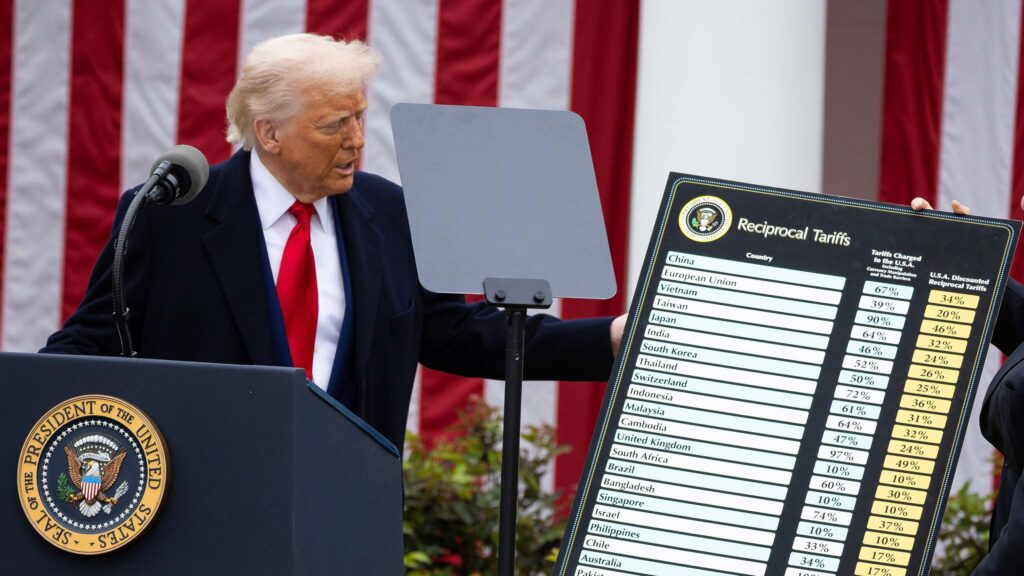How US trade tariffs will affect UK farming sectors
 US president Donald Trump announces the new tariffs © Francis Chung/Politico via AP Images/Shutterstock
US president Donald Trump announces the new tariffs © Francis Chung/Politico via AP Images/Shutterstock UK farming sectors are bracing for the impact on businesses of a 10% tariff on all UK goods exported to the US.
The 10% baseline tariff will be introduced on all US imports from 5 April, with some further country-specific tariffs due to come into effect from 9 April, such as 20% on the EU and 54% on China.
Some countries have already vowed to take retaliatory measures, and there are concerns that any repercussions may have further negative effects on global trade flows.
See also: Editor’s View: A week for big schemes at home and abroad
Talk of US trade deal
The UK government is continuing to push for a trade deal with the US in order to remove the tariffs, but there are concerns from farming organisations that this could lead to concessions which could allow imports produced to lower standards than in the UK, such as hormone-treated beef.
A document released by the White House following president Donald Trump’s tariff announcement on 2 April said: “The UK maintains non-science-based standards that severely restrict US exports of safe, high-quality beef and poultry products.”
Prime minister Sir Keir Starmer told business leaders on 3 April that “nobody wins in a trade war” and said his intention remained to secure a deal, but nothing was off the table.
Mr Starmer said: “Negotiations on an economic prosperity deal, one that strengthens our existing trading relationship – they continue, and we will fight for the best deal for Britain.
“Nonetheless, I do want to be clear I will only strike a deal if it is in the national interest and if it is the right thing to do for the security of working people.”
NFU reaction
The NFU has warned that the tariffs may also inadvertently result in products that were destined for the US market being redirected to the UK, which could have a negative impact.
NFU president Tom Bradshaw said: “We have been working closely with the government in the lead up to the announcements.
“While the UK has been hit by a lower baseline tariff compared to the EU, this remains a challenge for the UK and for agriculture, with the US being our second-largest export market behind the EU.
“While this is a developing and concerning situation, we are working in genuine partnership with the government and sharing our expertise on this to ensure, if there is any market disruption in response to a change in the movement of goods and products between affected countries, we can respond swiftly.”
UK exports
The US remains a key export destination for UK products, with industry figures showing the US accounted for 8.3% of cheese and 7.5% of pork exports in 2023.
The UK typically exports to the US each year £68m of cheese, £23m of pork and £2.9m of beef, according to figures from the AHDB.
Jess Corsair, senior economist at the AHDB, said: “Currently the UK has access to the US ‘rest of the world’ quota for beef exports.
“This quota was filled by 17 January in 2025, and then any beef exports are subject to tariffs of 26.4%. It is unclear whether the new 10% tariffs will be additional to the current 26.4% tariff.
“Additionally, it is unclear whether the 10% tariff will be additional to those countries who already have free trade agreements in place.
“Further clarification is needed regarding how these tariffs will be implemented alongside current FTAs, quotas and agreements.”
Dairy
Farmers Weekly spoke to several dairy exporters who said the US tariffs would be detrimental to their businesses.
It is expected the tariffs will have a big influence on dairy commodity products, while premium added-value British cheeses may be affected to a lesser extent, due to their higher price positioning.
There was also some concern it could lead to dairy products from other countries coming to the UK market and putting pressure on domestic prices.
Major Irish dairy processor Ornua said: “Ornua regrets the US decision to impose additional tariffs on Kerrygold [butter and cheese] and remains hopeful that a negotiated solution can be reached between the US and the EU.
“Our products are subject to US import duties and additional tariffs will have a negative impact on our business, on our US consumers, and on the dairy farmers who supply Kerrygold.”
Arable markets
Global grain markets had a relatively muted reaction to the tariffs, with much of the sentiment already priced in ahead of the announcement.
UK feed wheat futures opened at £166.55/t on 3 April for the May contract, down marginally on the previous day’s close.
Meanwhile, Paris rapeseed futures opened at €522/t (£439/t), down €2.5/t (£2.1/t) overnight.
Traders at United Oilseeds suggested the tariffs were having a negative price impact on oilseeds markets.
Whisky
The impact on the Scotch whisky sector is expected to be noticeable, with exports to the US worth more than £900m each year, and the market accounts for roughly 18% of total UK exports.
A spokesperson for the Scotch Whisky Association said: “The industry is disappointed that Scotch whisky could be impacted by these tariffs.
“We welcome the intensive efforts by the UK government to reach a deal with the US administration, and we continue to support this measured and pragmatic approach towards a mutually beneficial resolution.”
